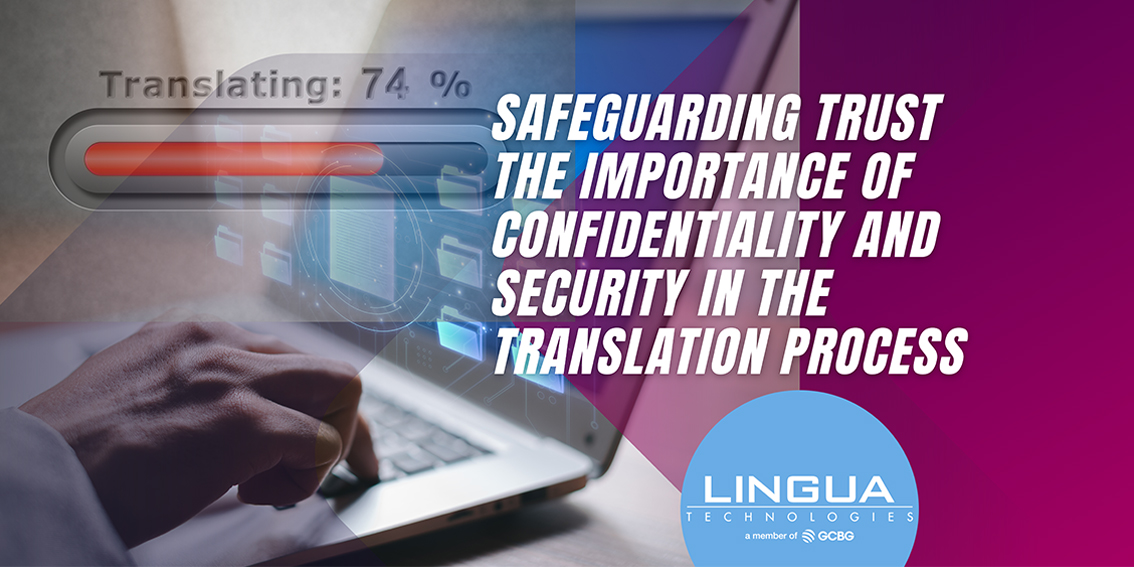In our interconnected world, the need for translation services is more prominent than ever. Whether it's for business expansion, cultural exchange, or personal communication, translations bridge the gaps between languages and cultures. However, with the increasing reliance on technology and digital platforms, ensuring confidentiality and security in the translation process has become crucial. This blog explores the significance of maintaining strict confidentiality and robust security measures to safeguard clients' trust and protect sensitive information during translation.
Confidentiality: A Foundation of Trust
Confidentiality lies at the core of the translation process, establishing a foundation of trust between translators and clients. When individuals or organizations seek translation services, they often entrust their valuable documents, contracts, or personal information to the translation company. Translation companies must maintain strict confidentiality to protect the integrity and privacy of such information.
Respecting the trust placed in them, professional translation companies adhere to strict ethical guidelines, ensuring that sensitive materials remain confidential. They recognize the importance of non-disclosure agreements (NDAs) and work diligently to safeguard the information shared with them. This commitment to confidentiality fosters a sense of security and encourages clients to rely on translation services for their sensitive materials.
Protecting Intellectual Property
Confidentiality in translation is particularly crucial when dealing with intellectual property (IP). Companies seeking translation services may require the translation of patents, research papers, or proprietary information. Unauthorized disclosure of such materials can have severe consequences, including intellectual property theft, financial losses, and damage to the company's reputation.
Translation companies well-versed in IP-related translations understand the significance of safeguarding intellectual property. They employ robust security measures to prevent unauthorized access to sensitive information. This may involve encryption, secure file transfer protocols, and secure storage systems. By implementing these measures, translation companies protect their client's interests and help maintain their intellectual property's integrity.
Data Protection and Compliance
As digitalization transforms the translation industry, the importance of data protection and compliance cannot be overstated. Translations often involve the use of computer-assisted translation (CAT) tools and cloud-based platforms for collaboration. While these technological advancements streamline the translation process, they also present potential vulnerabilities if adequate security measures are not in place.
Professional translation companies employ various measures to ensure client data security. These include using reputable translation software that complies with data protection regulations, employing secure communication channels, and regularly updating security protocols. Adhering to data protection and privacy laws such as the Personal Data Protection Act (PDPA) and General Data Protection Regulation (GDPR) is essential to maintain client trust and avoid legal ramifications.
Maintaining Client Relationships
Confidentiality and security in the translation process are not merely technical requirements but also crucial factors for maintaining strong client relationships. By demonstrating a commitment to confidentiality and security, translators show clients their interests and privacy are valued.
Moreover, word-of-mouth recommendations play a significant role in the translation industry. Clients who trust that their sensitive materials will be handled with the utmost care are more likely to recommend the services of a professional translation company to others. By prioritizing confidentiality and security, translators can build a reputation for reliability, thereby expanding their client base.
Confidentiality and security are cornerstones of the translation process. The responsibility to protect sensitive information lies with professional translation companies, who recognize the significance of maintaining client trust and safeguarding intellectual property. By implementing strict confidentiality measures, employing robust security protocols, and adhering to data protection regulations, translators ensure that the translation process remains secure and confidential.
In an increasingly interconnected world where information is easily accessible, translation companies prioritizing confidentiality and security stand out as trusted professional organizations. By upholding these principles, translation companies contribute to the smooth flow of information, promote global understanding, and strengthen relationships between languages and cultures.

